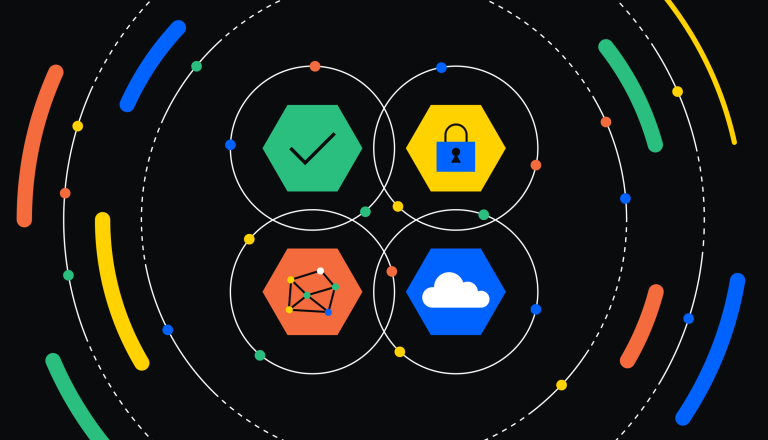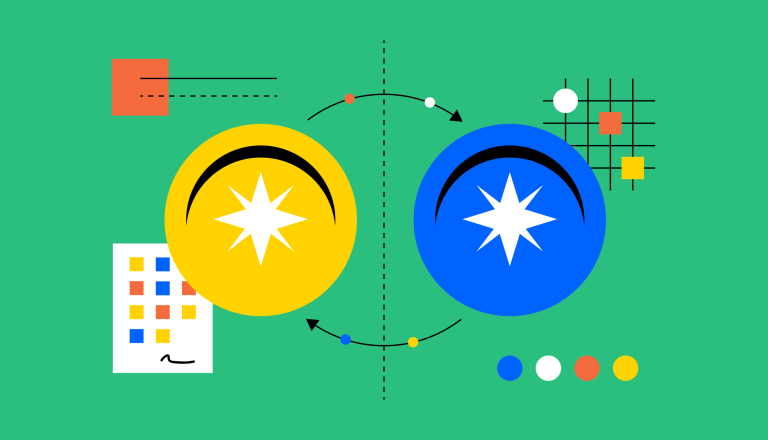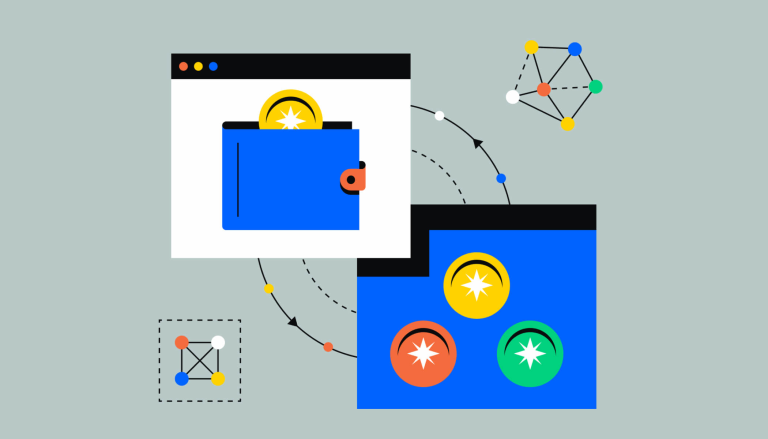Beginner’s guide to dapps
From Aave to Sandbox, meet the crypto-powered apps that let you do anything from play games to earn yield

Buying NFTs, swapping coins, and accessing play-to-earn games are some of the most popular activities in the crypto ecosystem, and if you’re interested in crypto, you’ve probably at least thought about trying out one of them.
These activities also all have something in common: they’re enabled by dapps, also known as decentralized applications. Dapps are similar to an app or game you might download on your mobile phone or computer, except instead of using an email address and password to access them, you can access them with a crypto wallet like Coinbase Wallet or Coinbase dapp wallet
And because dapps are built on blockchains, there are a few fundamental differences between them and regular mobile or computer apps.
What are some differences between dapps and traditional apps?
Decentralization
Because blockchains are decentralized peer-to-peer networks, the code powering dapps is hosted on public platforms where no one person or group has total control. Most dapp code is also open-source, making it available for anyone to view, audit and verify.
In contrast, the code for many mobile or computer apps lives on centralized computer servers controlled by a single entity. And commercial apps are rarely open-source, making it impossible for users to verify exactly how they work.
Privacy
A typical mobile or computer app requires some level of personal information, like your name, and email address or a phone number. Such apps may also track you via the data generated through your use of the app.
Because dapps are accessed via a crypto wallet, you don’t need to use your IRL identity to interact with them. You control your information, meaning you can completely disconnect from a dapp at any time and stop sharing data.
Censorship resistant
Because traditional apps run on centralized servers, governments can coerce companies to block access.
Dapps don’t require anyone’s permission to use — and no individual entity can stop you from connecting to an open blockchain network.
Smart contracts
Dapps are typically governed by smart contracts, which are automatically executed when certain terms are met. They don't require approval from intermediaries. Because the code in smart contracts is public and can be verified by anyone, audited smart contracts operate in predictable ways. No trust is required.
Control of traditional apps usually ladders back up to a single group or entity. Exact processes tend to be proprietary information. Transactions can’t be publicly audited or verified in the same way as they can on the blockchain.
Dapps exist on a wide variety of smart-contract compatible blockchains, including Ethereum, Solana, and Avalanche.
Looking to get started? Here are some examples of major dapps, organized by category.
Collect NFTs
NFTs, or non-fungible tokens, are one of the most popular crypto use cases to date. The $40 billion-plus market has minted a new class of influential artists, attracted new users to the crypto ecosystem, and has expanded the possibilities of what people think of when they hear the term “digital art.” If you’re looking to get into the NFT market, one of these dapps is probably a good place to start.
OpenSea
OpenSea is currently one of the largest NFT marketplaces in the world, with an annualized revenue of $45,210,101 as of March 2024. You’ve probably heard a bit about the NFT hype of the last year or so. Well, many of the people who’ve been buying and selling NFTs in that span have used OpenSea to do so. In March 2024, the platform had over 80,000 monthly active users. You can buy and sell NFTs based on the Ethereum, Polygon and Solana networks on OpenSea.
Magic Eden
Founded in 2021, Magic Eden is one of the most popular NFT marketplaces built on the Solana network. While Magic Eden has far fewer transactions than OpenSea, one key difference is that the transaction fees associated with using Solana are significantly cheaper than using Ethereum, making Solana more accessible to many people, especially new users of crypto. In 2024, Magic Eden has launched its Ethereum NFT marketplace.
LooksRare
With its user-friendly interface and robust community features, LooksRare has quickly gained traction among both seasoned collectors and newcomers. The platform supports a variety of blockchain networks, allowing users to buy, sell, and trade NFTs across different ecosystems.
Blur
Blur Marketplace is another decentralized platform that has made waves in the NFT space. What sets Blur apart is its innovative approach to gamification, allowing users to participate in various interactive experiences and challenges tied to NFT ownership. This gamified aspect adds an extra layer of engagement and excitement to the platform, attracting users seeking more than just a traditional marketplace experience.
Earn crypto using DeFi
DeFi, or decentralized finance, is a growing use-case of crypto and refers to dapps that are aiming to allow users make peer-to-peer financial transactions that they’d typically need to do through a financial institution. Using DeFi dapps, users are able to swap currencies, earn interest, borrow or lend tokens, and even take out insurance policies. When utilizing DeFi dapps, users aren’t subject to restrictions on how much currency they can move at a time or who they can transact with, and because these dapps are governed by smart contracts, users also aren’t exposed to many of the biases built into our traditional financial system. If you’re interested in how crypto can help replace the traditional financial system, one of these dapps will likely pique your interest.
Aave
Aave is currently one of the most popular DeFi apps. Users can lend their tokens to earn interest and can also borrow crypto using their tokens as collateral. It’s available to use across seven different blockchains, and users have collectively deposited nearly $20 billion into Aave.
Uniswap
Uniswap is the largest decentralized exchange (or DEX) operating on the Ethereum blockchain. It allows users anywhere in the world to trade crypto without an intermediary. Uniswap pioneered the Automated Market Maker model, in which users supply Ethereum tokens to Uniswap “liquidity pools” and algorithms set market prices (as opposed to order books, which match bids and asks on a centralized exchange like Coinbase) based on supply and demand. By supplying tokens to Uniswap liquidity pools, you can earn rewards while enabling peer-to-peer trading.
NFTfi
HODLing is a cornerstone of crypto culture, and it extends to NFTs too. Sometimes, no matter how much it's worth, people just don’t want to sell. If you have a high-value NFT that you don’t want to liquidate, NFTfi allows you to deposit your NFT as collateral, and receive a crypto loan directly from another user willing to provide that liquidity. NFTfi can be used on the Ethereum blockchain.
Play games
Imagine a universe where you can own the characters you’re playing as in video games, and where you can also earn currency for being successful at the game. That’s what is being built on blockchains with a new class of games, defined as play-to-earn games. Seen by many as the future of gaming, play-to-earn games have helped thousands of users across the globe supplement their income and support themselves.
Axie Infinity
Axie Infinity is one of the most popular crypto games and helped to popularize the term “play to earn.” In the game, which has been compared to Pokemon, users battle, train and raise NFT pets called Axies, and earn currency for winning battles and completing quests. At its peak last summer, Axie boasted around one million daily users. Playing Axie infinity requires you first buy at least three Axies from the game’s marketplace.
DeFi Kingdoms
DeFi Kingdoms is another play-to-earn game that is built on the Harmony blockchain. Reminiscent of the game Runescape, players in DeFi Kingdoms can buy an NFT character, known as “heroes” and complete quests in order to level up their heroes’ various traits, as well as to earn the in-game currency. The game also combines gaming with aspects of DeFi, allowing users to earn interest on their in-game tokens by depositing them into the game’s bank.
Sandbox
Have you heard of the metaverse? (Just kidding, of course you have.) Sandbox is one of the most popular blockchain-based metaverse worlds, built on the Ethereum blockchain. In Sandbox, users can own land, which can be used to build pretty much any type of application on top of, from events, to games, to branded experiences. The game has a built-in “game maker” that allows anyone to build a game, even with no experience, and more seasoned game designers have the ability to create more immersive experiences that anyone can then navigate to.


